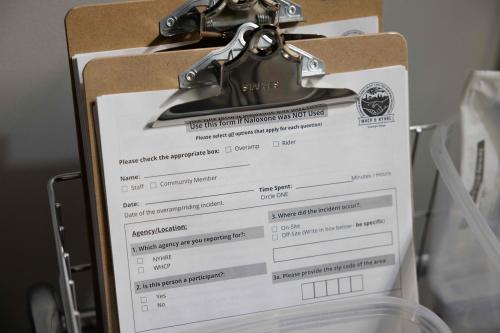Sharon Reif, Alisa B. Busch, Richard Frank, Dominic Hodgkin, Constance Horgan, Haiden A. Huskamp, Sharon-Lise Normand, Maureen Stewart, and Cindy Parks Thomas, were invited by the White House Office of National Drug Control Policy to highlight the ways in which the National Drug Control Strategy can be strengthened to support the health of all Americans, especially those experiencing the consequences of substance use disorders. This multidisciplinary group of researchers responds to this request for input with expertise in health services research, economics, statistics, clinical practice, and policy, in particular on substance use treatment delivery and payment systems performance and improvement, as funded by NIDA.
The authors focus on two priority areas for the National Drug Control Strategy:
- Provide treatment that leads to long-term recovery
- Innovate in research and data to support drug control strategies
An overarching concern is that the substance use treatment field lacks accountability, and in turn, research on the appropriate elements of accountability. This is reflected in the need for actionable quality metrics; their incorporation in payment systems; improved access to evidence-based treatments; and approaches to hold providers, payers, and states accountable for providing adequate and appropriate care. This lack of accountability interferes with the provision of high-quality treatment and ultimately the ability to support people who have substance use problems in attaining and maintaining long-term recovery and reducing the harmful effects of substance use on their health and functioning. Thus, accountability is important to address if we are to improve substance use treatment and population health.
In light of these knowledge gaps, we recommend that the Strategy focus on the following:
- Maintain and improve systematic data collection (for example, the National Survey on Drug Use and Health (NSDUH) and the Drug Abuse Warning Network (DAWN))
- Emphasize quality measurement and use of quality metrics as a tool in clinical care and payment systems that increase accountability and improve care
- Encourage states to use their oversight to improve care
- Encourage the use of large, varied datasets and capitalize on modern analytical methods, such as causal inference combined with machine learning, to consider what is working currently and for whom, and to test alternative approaches
Read the full request for input letter here
-
Acknowledgements and disclosures
The authors gratefully acknowledge grant support from the National Institute on Drug Abuse (NIDA).
The Brookings Institution is committed to quality, independence, and impact.
We are supported by a diverse array of funders. In line with our values and policies, each Brookings publication represents the sole views of its author(s).














Commentary
Request for input on the National Drug Control Strategy
July 24, 2025